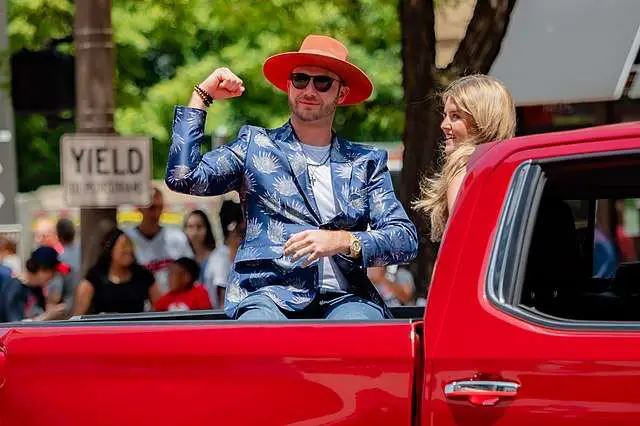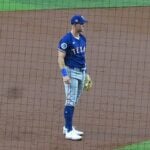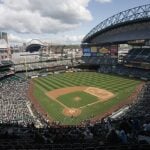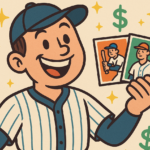Last Updated on July 16, 2024 by Matt Musico
The Home Run Derby is one of the hallmark events of All-Star week each summer, and for good reason — it’s one helluva show. That’s especially the case when you look back at the older MLB Home Run Derby winners and how little it used to take to win.
Related: A Complete Guide to the Best Home Run Derby Performances
MLB Home Run Derby Winners
As we can see, the Home Run Derby has been taking place since 1985 and hasn’t happened in just two different instances. The most recent occurrence was in 2020 due to the COVID pandemic and the shortened MLB season that resulted from it. The other happened in 1988 because it was washed out due to rain.
Below, you’ll see the winner of each derby, the location of it, what the general format of the competition was, and who hit how many home runs. If the format didn’t change from the previous year, we won’t address it again. Don’t forget to also check out some of the craziest single-round performances in Derby history, as well.
1985: Dave Parker, Reds
Location: Metrodome in Minneapolis, MN
Format: While there was a singular winner crowned, this was a contest between both leagues, with an equal number of hitters representing the National League and American League. Hitters received two turns in the batter’s box, getting five outs each (any batted ball that didn’t result in a dinger was considered an out).
Results:
- Dave Parker: 6
- Tom Brunansky, Carlton Fisk, Dale Murphy, Eddie Murray, Jim Rice: 4
- Jack Clark, Steve Garvey, Ryne Sandberg: 2
- Cal Ripken Jr.: 1
1986: Wally Joyner (Angels), Darryl Strawberry (Mets)

Location: Astrodome in Houston, TX
Results:
- Wally Joyner, Darryl Strawberry: 4
- Dave Parker: 3
- Jesse Barfield: 2
- Hubie Brooks, Jose Canseco: 1
1987: Andre Dawson, Cubs
Location: Oakland-Alameda County Coliseum in Oakland, CA
Results:
- Andre Dawson: 4
- Ozzie Virgil: 2
- George Bell, Mark McGwire: 1
1988: Cancelled because of rain
Can you imagine the Home Run Derby getting rained out with no plan to be rescheduled in today’s game? Yea, me neither.
1989: Ruben Sierra (Rangers), Eric Davis (Reds)
Location: Anaheim Stadium in Anaheim, CA
Results:
- Eric Davis, Ruben Sierra: 3
- Glenn Davis, Howard Johnson, Kevin Mitchell: 2
- Bo Jackson, Mickey Tettleton: 1
- Gary Gaetti: 0
1990: Ryne Sandberg, Cubs
Location: Wrigley Field in Chicago, IL
Results:
- Ryne Sandberg: 3
- Mark McGwire, Matt Williams: 1
- Bobby Bonilla, Jose Canseco, Cecil Fielder, Ken Griffey Jr., Darryl Strawberry: 0
1991: Cal Ripken Jr., Orioles

Location: SkyDome in Toronto, Canada
Format: Hitters were given three rounds of 10 outs to try and hit as many homers as possible. After Round 1, the top four players would move on. After Round 2, the top two would battle it out for the title.
Results:
- Cal Ripken Jr.: 12
- Paul O’Neill: 5
- Cecil Fielder: 4
- George Bell, Joe Carter, Danny Tartabull: 2
- Howard Johnson, Chris Sabo: 0
1992: Mark McGwire, Athletics
Location: Jack Murphy Stadium in San Diego, CA
Results:
- Mark McGwire: 12
- Ken Griffey Jr.: 7
- Joe Carter, Cal Ripken Jr., Gary Sheffield, Larry Walker: 4
- Fred McGriff: 3
- Barry Bonds: 2
1993: Juan Gonzalez, Rangers

Location: Oriole Park at Camden Yards in Baltimore, MD
Results:
- Juan Gonzalez: 7 (won in playoff)
- Ken Griffey Jr.: 7
- Barry Bonds, Bobby Bonilla: 5
- Cecil Fielder: 4
- Albert Belle: 3
- David Justice: 2
- Mike Piazza: 0
1994: Ken Griffey Jr., Mariners

Location: Three Rivers Stadium in Pittsburgh, PA
Results:
- Ken Griffey, Jr.: 7
- Fred McGriff: 5
- Ruben Sierra, Frank Thomas: 4
- Jeff Bagwell, Dante Bichette: 3
- Albert Belle: 2
- Mike Piazza: 0
1995: Frank Thomas, White Sox

Location: The Ballpark in Arlington in Arlington, TX
Results:
- Frank Thomas: 15
- Albert Belle: 16
- Mo Vaughn, Ron Gant: 6
- Manny Ramirez: 3
- Sammy Sosa, Reggie Sanders, Raul Mondesi: 2
1996: Barry Bonds, Giants

Location: Veterans Stadium in Philadelphia, PA
Results:
- Barry Bonds: 17
- Mark McGwire: 15
- Brady Anderson: 11
- Jay Buhner: 8
- Henry Rodriguez: 3
- Jeff Bagwell, Joe Carter: 2
- Ellis Burks: 1
- Gary Sheffield, Greg Vaughn: 0
1997: Tino Martinez, Yankees

Location: Jacobs Field in Cleveland, OH
Results:
- Tino Martinez: 16
- Larry Walker: 19
- Mark McGwire: 7
- Jeff Bagwell: 5
- Brady Anderson: 4
- Ken Griffey Jr., Chipper Jones: 3
- Ray Lankford: 2
- Nomar Garciaparra, Jim Thome: 0
1998: Ken Griffey Jr., Mariners

Location: Coors Field in Denver, CO
Results:
- Ken Griffey, Jr.: 19
- Jim Thome: 17
- Vinny Castilla: 12
- Rafael Palmeiro: 10
- Moises Alou: 7
- Javy Lopez, Alex Rodriguez: 5
- Mark McGwire: 4
- Damion Easley: 2
- Chipper Jones: 1
1999: Ken Griffey Jr., Mariners

Location: Fenway Park in Boston, MA
Results:
- Ken Griffey, Jr.: 16
- Jeromy Burnitz: 14
- Mark McGwire: 16
- Jeff Bagwell: 6
- Larry Walker, Nomar Garciaparra, B.J. Surhoff, Shawn Green: 2
- Sammy Sosa, John Jaha: 1
2000: Sammy Sosa, Cubs

Location: Turner Field in Atlanta, GA
Format: Hitters were given 10 outs per round, but after the first round was completed, the four players who advanced were then put into a seeded bracket, with the winners of each matchup facing off in the finals.
Results:
- Sammy Sosa: 26
- Ken Griffey Jr. 11
- Carl Everett: 12
- Carlos Delgado: 6
- Edgar Martinez, Chipper Jones, Vladimir Guerrero: 2
- Ivan Rodriguez: 1
2001: Luis Gonzalez, Diamondbacks

Location: Safeco Field in Seattle, WA
Results:
- Luis Gonzalez: 16
- Sammy Sosa: 13
- Jason Giambi: 20
- Barry Bonds: 10
- Bret Boone: 3
- Todd Helton, Alex Rodriguez: 2
- Troy Glaus: 0
2002: Jason Giambi, Yankees

Location: Miller Park in Milwaukee, WI
Results:
- Jason Giambi: 24
- Sammy Sosa: 18
- Paul Konerko: 12
- Richie Sexson: 10
- Torii Hunter: 3
- Alex Rodriguez, Barry Bonds: 2
- Lance Berkman: 1
2003: Garret Anderson, Angels
Location: U.S. Cellular Field in Chicago, IL
Results:
- Garret Anderson: 22
- Albert Pujols: 26
- Jason Giambi: 23
- Jim Edmonds: 8
- Gary Sheffield: 4
- Carlos Delgado: 2
- Richie Sexson: 1
- Bret Boone: 0
2004: Miguel Tejada, Orioles
Location: Minute Maid Park in Houston, TX
Format: Hitters were given 10 outs per round, with the top four advancing to the second round. The top two from the second round faced off in the finals.
Results:
- Miguel Tejada: 27
- Lance Berkman: 21
- Rafael Palmeiro: 14
- Barry Bonds: 11
- Sammy Sosa: 5
- Jim Thome: 4
- Hank Blalock: 3
- David Ortiz: 3
2005: Bobby Abreu, Phillies

Location: Comerica Park in Detroit, MI
Format: Hitters were given 10 outs per round, with the top four advancing to the second round. The top two from the second round faced off in the finals. To honor the inaugural World Baseball Classic coming in 2006, Players represented seven different nations (Venezuela, Panama, Dominican Republic, South Korea, Netherlands, United States, Canada) and Puerto Rico.
Results:
- Bobby Abreu: 41
- Ivan Rodriguez: 20
- Carlos Lee: 15
- David Ortiz: 20
- Hee-Seop Choi: 5
- Andruw Jones: 5
- Mark Teixeira: 2
- Jason Bay: 0
2006: Ryan Howard, Phillies

Location: PNC Park in Pittsburgh, PA
Format: Round-by-round totals were no more, and total home runs were used in its place. So, the top four hitters from the first round advanced to the semifinals, but their homer total from that first round came with them. From there, the two players with the most total home runs faced off in the finals, which is when the totals were wiped clean and the player who slugged the most dingers was crowned champion.
Results:
- Ryan Howard: 23
- David Wright: 22
- Miguel Cabrera: 15
- David Ortiz: 13
- Jermaine Dye: 7
- Miguel Tejada: 3
- Lance Berkman: 3
- Troy Glaus: 1
2007: Vladimir Guerrero, Angels

Location: AT&T Park in San Francisco, CA
Results:
- Vladimir Guerrero: 17
- Alex Rios: 19
- Matt Holliday, Albert Pujols: 13
- Justin Morneau: 4
- Prince Fielder, Ryan Howard: 3
- Magglio Ordonez: 2
2008: Justin Morneau, Twins

Location: Yankee Stadium in New York, NY
Results:
- Justin Morneau: 22
- Josh Hamilton: 35 (Including one of the most insane single-round Home Run Derby performances ever.)
- Lance Berkman: 14
- Ryan Braun: 14
- Grady Sizemore, Dan Uggla: 6
- Chase Utley: 5
- Evan Longoria: 3
2009: Prince Fielder, Brewers
Location: Busch Stadium in St. Louis, MO
Results:
- Prince Fielder: 23
- Nelson Cruz: 21
- Ryan Howard: 15
- Albert Pujols: 11
- Carlos Pena, Joe Mauer: 5
- Adrian Gonzalez: 2
- Brandon Inge: 0
2010: David Ortiz, Red Sox

Location: Angel Stadium of Anaheim in Anaheim, CA
Results:
- David Ortiz: 32
- Hanley Ramirez: 26
- Corey Hart: 13
- Miguel Cabrera: 12
- Matt Holliday: 5
- Nick Swisher: 4
- Vernon Wells: 2
- Chris Young: 1
2011: Robinson Cano, Yankees

Location: Chase Field in Phoenix, AZ
Results:
- Robinson Cano: 32
- Adrian Gonzalez: 31
- Prince Fielder, David Ortiz: 9
- Matt Holliday: 5
- Jose Bautista: 4
- Rickie Weeks: 3
- Matt Kemp: 2
2012: Prince Fielder, Tigers

Location: Kauffman Stadium in Kansas City, MO
Results:
- Prince Fielder: 28
- Jose Bautista: 20
- Mark Trumbo: 13
- Carlos Beltran: 12
- Carlos Gonzalez, Andrew McCutchen: 4
- Matt Kemp: 1
- Robinson Cano: 0
2013: Yoenis Cespedes, Athletics

Location: Citi Field in New York, NY
Results:
- Yoenis Cespedes: 32
- Bryce Harper: 24
- Michael Cuddyer: 15
- Chris Davis: 12
- Pedro Alvarez: 6
- Prince Fielder, David Wright: 5
- Robinson Cano: 4
2014: Yoenis Cespedes, Athletics

Location: Target Field in Minneapolis, MN
Format: A bracket format was used for this MLB home run derby, which gave extra incentive to the top home-run hitter in each league during the first round. Whoever came out on top for the AL and NL All-Stars (it was Jose Bautista and Giancarlo Stanton, in this case), were given a second-round bye and an entry directly into the semifinals.
Results:
- Yoenis Cespedes: 28
- Todd Frazier: 10
- Jose Bautista: 14
- Giancarlo Stanton: 6
- Adam Jones: 7
- Troy Tulowitzki: 6
- Josh Donaldson: 3
- Justin Morneau, Brain Dozier: 2
- Yasiel Puig: 0
2015: Todd Frazier, Reds

Location: Great American Ball Park in Cincinnati, OH
Format: The eight participants (four from each league) were put into a bracket to go head-to-head against someone from the opposite league. Instead of getting 10 outs per round, a five-minute clock was used. Homers stopped the clock, non-homers restarted the clock, and hitters were awarded with bonus time for extra-long dingers.
Results:
- Todd Frazier: 39
- Joc Pederson: 39
- Albert Pujols: 21
- Josh Donaldson: 18
- Prince Fielder: 13
- Manny Machado: 12
- Kris Bryant: 9
- Anthony Rizzo: 8
2016: Giancarlo Stanton, Marlins

Location: Petco Park in San Diego, CA
Results:
- Giancarlo Stanton: 61
- Todd Frazier: 42
- Mark Trumbo: 30
- Adam Duvall: 26
- Corey Seager: 15
- Carlos Gonzalez: 12
- Wil Myers: 10
- Robinson Cano: 7
2017: Aaron Judge, Yankees

Location: Marlins Park in Miami, FL
Results:
- Aaron Judge: 47
- Miguel Sano: 32
- Cody Bellinger, Gary Sanchez: 27
- Justin Bour: 22
- Giancarlo Stanton: 16
- Charlie Blackmon: 14
- Mike Moustakas: 10
2018: Bryce Harper, Nationals

Location: Nationals Park in Washington, D.C.
Results:
- Bryce Harper: 45
- Kyle Schwarber: 55
- Rhys Hoskins: 37
- Max Muncy: 29
- Javier Baez: 17
- Alex Bregman: 15
- Jesus Aguilar, Freddie Freeman: 12
2019: Pete Alonso, Mets

Location: Progressive Field in Cleveland, OH
Format: The eight participants were put into a bracket for a head-to-head matchup. Instead of getting 10 outs per round, a five-minute clock was used. Homers stopped the clock, non-homers restarted the clock, and hitters were awarded with bonus time for extra-long dingers. MLB also added a $1 million prize for the winner.
Results:
- Pete Alonso: 57
- Guerrero Jr.: 91
- Joc Pederson: 60
- Ronald Acuna Jr. 44
- Josh Bell: 18
- Alex Bregman: 16
- Matt Chapman, Carlos Santana: 13
2020: Cancelled because of the COVID-19 pandemic
2021: Pete Alonso, Mets

Location: Coors Field in Denver, CO
Format: The eight participants were put into a bracket for a head-to-head matchup, and seeding was determined by how many homers they had hit so far during the regular season. The time limit was changed to three minutes with a bonus of 30 seconds. Another 30-second bonus was added (giving a player one total minute extra) if they hit a home run 475-plus feet during their first three minutes. There is one additional minute added if there is a tie, and if the tie remains after that, each hitter gets three swings.
Results:
- Pete Alonso: 74
- Trey Mancini: 59
- Juan Soto: 46
- Trevor Story: 32
- Shohei Ohtani, Salvador Perez: 28
- Matt Olson: 23
- Joey Gallo: 19
2022: Juan Soto, Nationals

Location: Dodger Stadium in Los Angeles, CA
Format: Eight participants were put into a bracket for a head-to-head matchup. Seeding was determined by how many first-half homers they hit. Hitters received three-minute timed at-bats in the first two rounds (two-minute at-bats in the finals). Each slugger was allowed to use one 45-second timeout. If they slugged at least two homers 440-plus feet, they earned 30 seconds of bonus time in addition to the 30 seconds everyone gets at the end of each round. Two tiebreakers are in place. The first is a one-minute at-bat to hit as many homers as possible. If both players are still tied, they have a Swing-Off, where they get three swings a piece to see if the tie can be broken.
Results:
- Juan Soto: 53
- Julio Rodríguez: 81
- Pete Alonso: 43
- Albert Pujols 35
- Corey Seager: 24
- Ronald Acuña Jr.: 19
- Kyle Schwarber: 19
- José Ramírez: 17
2023: Vladimir Guerrero Jr., Blue Jays

Location: T-Mobile Park in Seattle, WA
Format: Eight participants were put into a bracket for a head-to-head matchup. Seeding was determined by how many first-half homers they hit. Hitters received three-minute timed at-bats in the first two rounds (two-minute at-bats in the finals). Each slugger was allowed to use one 45-second timeout. If they slugged at least two homers 440-plus feet, they earned 30 seconds of bonus time in addition to the 30 seconds everyone gets at the end of each round.
Results:
- Vladimir Guerrero Jr.: 72
- Randy Arozarena: 82
- Julio Rodriguez: 61
- Luis Robert: 50
- Adley Rutschman: 27
- Pete Alonso: 21
- Adolis Garcia: 17
- Mookie Betts: 11
2024: Teoscar Hernandez, Dodgers

Location: Globe Life Field in Arlington, TX
Format: Eight participants all competed against one another in the first round. The top four home run totals moved on to the second round, which became a head-to-head bracket-style matchup. Each of the first two rounds is three minutes long with a 40-pitch limit (whichever comes first), while the finals are two minutes long. Hitters get three outs for bonus time, and if they hit a ball 425-plus feet, they get a fourth out.
Results:
- Teoscar Hernandez: 49
- Bobby Witt Jr.: 50
- Alec Bohm: 36
- Jose Ramirez: 33
- Adolis Garcia: 18
- Marcell Ozuna: 16
- Pete Alonso: 12
- Gunnar Henderson: 11
Want to see some homers in person this season? Of course you do. Grab MLB tickets from our friends at Vivid Seats. And before you get to the stadium, make sure you’re decked out in the right gear. Get your favorite team’s official merch from the MLB Shop or a ‘Big Dinger Energy’ shirt from our apparel store.





Leave a Reply